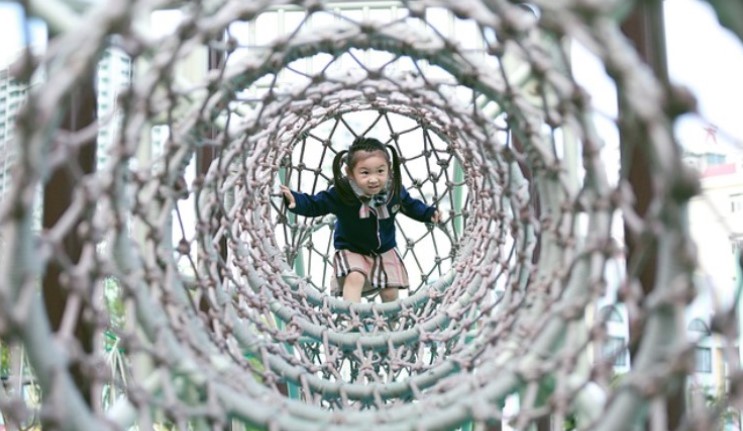
RESEARCH NEWS
Encouraging risk-taking in children may reduce the prevalence of childhood anxiety
A new international study suggests that parents who employ challenging parent behavioural (CPB) methods – active physical and verbal behaviours that encourage children to push their limits – are likely protecting their children from developing childhood anxiety disorders.
Researchers from Macquarie University’s Centre for Emotional Health, along with partners from the University of Amsterdam and the University of Reading, surveyed 312 families with preschool-aged children across the Netherlands and Australia. Results showed that the parents who scored higher in their CPB methods, thereby encouraging their kids to push their limits to a greater extent, had children who were less at risk of exhibiting anxiety disorder symptoms, demonstrating that CPB was related to significantly less anxiety in children.
CPB encourages safe risk-taking in children such as giving them a fright, engaging in rough-and-tumble play or letting them lose a game, as well as encouraging them to practice social assertion and confidently enter into unfamiliar situations. The study aimed to build upon existing research that establishes a relationship between parenting behaviours – particularly overinvolvement and overcontrol – and the development and maintenance of childhood anxiety disorders.
“Around seven per cent of Australian kids between the ages of four and seventeen have an anxiety disorder,” explains Professor Jennie Hudson, Director of Centre for Emotional Health at Macquarie University and co-author of the study. “The fact is that we really need to learn more about how we can help families to reduce this percentage. While previous research has shown that encouraging risk taking behaviours helps cognitive, social and emotional development, our study shows that this method of parenting may also help reduce the risk of children developing an anxiety disorder.”
To determine the effects of CPB on preschool-aged children, parents’ CPB was assessed via a questionnaire assessing how much the parents encourage the exhibition of risky behaviour in their children, as well as the extent to which they encourage their children to venture beyond their comfort zones.
“While Dutch and Australian mothers showed no differences in CPB towards their sons or daughters, both Dutch and Australian fathers of sons demonstrated more competition towards their sons than fathers of daughters. Dutch fathers in particular reported more rough-and-tumble play than the other groups of parents,” says Rebecca Lazarus from Macquarie University, another co-author of the study.
The results are promising in raising the clinical relevance of CPB methods, which could potentially be used to aid parents in helping their children’s wellbeing.
“While this isn’t a cure for anxiety, and we cannot at this stage determine causality, the results are promising in terms of parent education. By gently encouraging their kids in a reasonable way to push their limits, parents could be helping to reduce their child’s risk of developing an anxiety disorder, which is a great insight,” concluded Professor Hudson.
About The Centre for Emotional Health
The Centre for Emotional Health Clinic (CEHC) is a centre of excellence, aimed at furthering our understanding of emotional disorders and improving methods of treatment. In addition to our research programs, we also offer private psychological treatment. Clients who seek help at the CEHC will receive state of the art assessment and treatment based on internationally recognised research, much of which has been conducted by our team over the past 20 years.
Psychologists at the CEH Clinic work with clients of all ages, including children, adolescents, adults and older adults.
Hello,
This article around using CPB methods is very interesting. I am a primary school teacher. Can I please have a copy of the full article if possible?
Jane Gallie
HI Jane
I have forwarded your request to Prof Jennie Hudson with your details.
Regards
David Han
(Alumni Relations Office)
Hi, I’m currently enrolled in my Master of Teaching (Early Childhood) and am interested in following the research you are doing and finding a bit more about it. If there’s anyway I can do that, please let me know
Hi Michelle
Please reach out to the Centre for Emotional Health on ehc.admin@mq.edu.au. Otherwise you can find more information on their website:
https://www.mq.edu.au/research/research-centres-groups-and-facilities/healthy-people/centres/centre-for-emotional-health-ceh
Regards
David Han
(Alumni Relations Office)